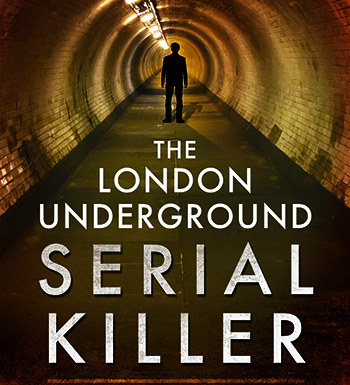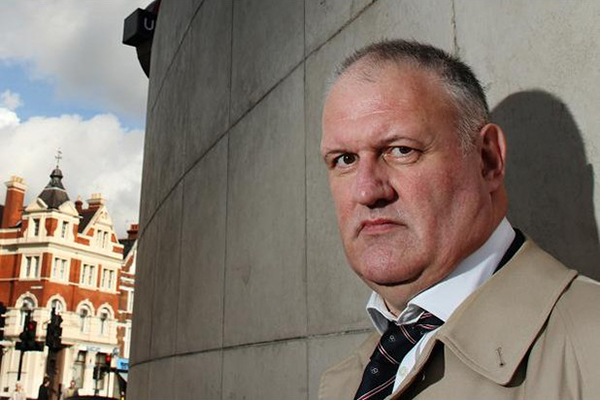THE spine-chilling story of Ireland’s only known serial killer has come to light in a new book.
The London Underground Serial Killer, written by now retired police detective Geoff Platt who worked on the case, reveals the gruesome details of Irishman Kieran Kelly, who murdered 16 people by pushing them in front of trains on the Underground.
When he was in prison, Platt spent two years with Kelly. “I was living with him full time. I was the only person he was allowed to speak to.” Kelly unburdened himself to Platt, giving him details about his killings and his life as a vagrant in London.
Kieran Patrick Kelly was born in Rathdowney, Co Laois. He was a Catholic and a Republican who served in the Irish Army. He married once in Dublin and again later in London and is believed to have children who would still be alive today.
In 1953, Kelly came to London around the time of came the Queen’s Coronation celebrations. His Irish friends, who worked as labourers, told him to take the Northern line towards Morden where he would find cheap lodgings. He took their advice, dropping his things at Tooting Bec and travelled back towards central London to join the party.
What then happened next, led to Kelly committing his first cold-blooded murder. Platt says he believes Kelly was gay, but that he had kept his sexuality a secret. Homosexuality was illegal in Ireland at the time, and being homosexual meant becoming a social pariah.
After a day of drinking, Kelly and his friend Christy Smith picked up prostitutes. Platt believes that Kelly feared his friend knew he was gay and did so to allay Smith about his sexuality, but the fear of being discovered drove him to kill.
Later in Stockwell tube station as he heard the train approaching he told Platt: “I saw a blinding flash, it was an ephinany, I realised the solution”. And so, he pushed his best friend under the Tube.
Kelly fled back to Ireland, but later returned to London where he lived around Tooting Bec and Clapham Common, an alcoholic and a vagrant. He was later arrested, not for murder but for stealing food.
As well as his first-hand memories of Kelly, Platt has undertaken painstaking research to piece the details of Kelly’s life together. Many documents relating to Kelly only became available in 2013 because of the thirty-year rule [a law in the UK and Ireland that allows government papers to be made to the public after 30 years].
Records show that Kelly had already been charged with eight murders before he became known to Platt, but was acquitted of all of them.
At Tooting Bec in early 1983, he was seen by three men push a man under a train. The men restrained him and called the police. Kelly was interviewed, charged and appeared at the Old Bailey but was acquitted due to lack of motive.
His life in London was one of brutality and poverty among gangs of homeless people, where Kelly, a slight man, had to assert himself. “He was an alcoholic. He was looking over his shoulder his whole life”, says Platt.
 In 1983, Kelly committed his final murder. He went to Clapham Common looking for drink money with his friend Paul McManus. He approached a 75-year-old man and threatened him unless he handed over his watch and wedding ring. The elderly man called the police and although they couldn’t find the watch or ring, they arrested Kelly and his friend for being drunk and disorderly.
In 1983, Kelly committed his final murder. He went to Clapham Common looking for drink money with his friend Paul McManus. He approached a 75-year-old man and threatened him unless he handed over his watch and wedding ring. The elderly man called the police and although they couldn’t find the watch or ring, they arrested Kelly and his friend for being drunk and disorderly.
The two were delivered to Clapham police station where newly appointed Sergeant Chris Lynch, ordered that they be searched and kept in a cell to sober up.
They were put in a cell with a man called William Boyd, who was drunk, asleep and snoring. Kelly told him to “shut the f*ck up” up a few times and then took his scarf and socks off and strangled him.
After this, “loaded with adrenaline,” Platt says Kelly “couldn’t stop talking”. The police interviewed him and he admitted 16 murders.
Platt and the team of Serious Crime Squad Officers from South London who worked on Kelly’s case said they believed he was exaggerating but when they checked Kelly’s story, the details he provided matched with reports of men falling to their deaths in Tube stations.
Even more shocking, is that Kelly had also played star witness on the scene of the murders.
Time and time again, he told police that he had been talking to a poor, depressed man about his unfaithful wife, when the train arrived at the station and he jumped underneath it. He did this countless times but no one joined the dots until Kelly confessed.
The implications of Kelly’s actions left the victims' families devastated. Women lost their husbands, the fathers of their children, they were accused of being 'slags', unfaithful women.
Part of Platt’s work was to contact insurance companies who had refused to pay out on life insurance polices on grounds that of suicide. The written confession meant they were able to get money back for the families, many of whom had "been thrust into awful situations".
Platt explains that until his book was published, very little was known, and nothing had been written about Kelly and his crime spree. “The Home Office received a report from the Police but deemed it not of public interest.”
That decision was made at the time because the police thought people would be too scared to travel to work on the Northern line and there would be mass hysteria in London.
Kelly was eventually convicted of two murders. It would have been to costly to try him for the rest, and it was recommended that he should never be released.
Only 53 people in British prisons are serving 'whole life terms', meaning they will die in prison, and Kelly was one of them.
The London Underground Serial Killer by Geoff Platt is available here



